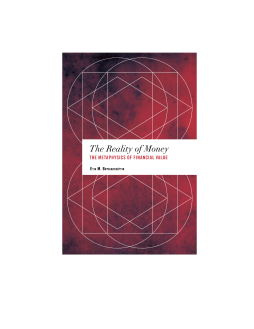
Additional Information
Book Details
Abstract
What is money and how does it acquire its value? How do we assign a measurable monetary value to human goods that do not seem quantifiable? What role does money play in the structure of society? Is money an illusion or is it real?
Despite the enormous impact of money on the structure of human society, as well as its effect on our daily decision-making, surprisingly little philosophical work has been done on money to date. This book examines the metaphysical foundations of money as well as the power structures that characterize the world of finance, connecting the ontology of money to considerations about inequality and other real-life issues. By throwing light on the metaphysical structure of money and financial value, Eyja M. Brynjarsdóttir seeks to further the philosophical discussion of money and contribute to a broader critique of the monetary system.
Whether we like it or not, money is an issue that is of interest to all of us. Eyja Brynjarsdóttir explores it from a broad range of philosophical perspectives: its metaphysical underpinnings, but also its role in society and its ethical and political consequences. Drawing on historical, psychological and economic theories, Brynjarsdóttir’s philosophical arguments bust many of our prejudices about money. She shows how much philosophy can bring to the table when it comes to questioning and rethinking fundamental elements of our social order such as the monetary system.
Lisa Herzog, Professor of Political Philosophy and Theory, Bavarian School of Public Policy, Technical University of Munich
This wonderfully engaging and wide-ranging book is about much more than the metaphysics of money. It is also immensely illuminating on social justice issues related to money, such as inequality, basic income proposals, and gender. It's a rare philosophical page-turner.
Jennifer M. Saul, Professor and Director of Graduate Studies, Department of Philosophy, University of Sheffield
Money is so ever-present in contemporary society that we tend to take its existence and nature for granted. However, this book highlights how money is both more elusive and more important than other marketable “things”. In clear and accessible language, the book introduces a range of interesting philosophical perspectives on money. I recommend it to all readers seeking a deeper understanding of modern market society.
Joakim Sandberg, Professor and Director of the Financial Ethics Research Group, University of Gothenburg
This book provides a lucid and rigorous philosophy of money. It offers a hugely valuable and timely contribution to thinking about the ontology of money: about its reality, manifestations, and consequences in the world. Drawing on historical and contemporary accounts, as well as making use of real-world examples, Brynjarsdóttir presents a comprehensive metaphysical investigation of money. The book is a must-read for everyone interested in the social ontology of financial value.
Mari Mikkola, Associate Professor, Faculty of Philosophy, University of Oxford
Eyja M. Brynjarsdottir is a Researcher in Philosophy at the University of Iceland. She has published papers on metaphysics, philosophy of mind and feminist philosophy.
Table of Contents
| Section Title | Page | Action | Price |
|---|---|---|---|
| Contents | v | ||
| Acknowledgments | vii | ||
| Introduction | 1 | ||
| Part I: The Ontology of Money | 5 | ||
| 1 What Is Money? | 7 | ||
| The Question Posed | 7 | ||
| Commodity Theory, State Theory, and Credit Theory | 10 | ||
| Collective Acceptance? | 14 | ||
| Alternatives to Collective Acceptance Theories | 18 | ||
| Psychology | 21 | ||
| Conclusion | 25 | ||
| 2 On Monetary Value | 27 | ||
| Exchange Value | 27 | ||
| Aristotle and the True Function of Money | 28 | ||
| Locke and Silver | 32 | ||
| Another View on Intrinsic Value | 36 | ||
| Conclusion | 42 | ||
| 3 Is It Real? | 45 | ||
| Different Senses of “Real” | 45 | ||
| The Relevant Sense of “Subjective” | 48 | ||
| Subjective Properties as Euthyphronic | 50 | ||
| Contingency on the Actual | 52 | ||
| Non-Idealized Subjects | 55 | ||
| Egalitarianism or Elitism? | 59 | ||
| Secundum Quid and Extrinsic | 62 | ||
| Rarely Entirely Subjective | 65 | ||
| Money as an Interactive and Subjective Kind | 66 | ||
| Conclusion | 70 | ||
| Part II: Money in the World | 73 | ||
| 4 Money as a Measuring Device | 75 | ||
| Exchanging One Thing for Another | 75 | ||
| Measuring Things | 76 | ||
| Measuring People | 79 | ||
| Money and Work | 84 | ||
| Commodification | 88 | ||
| Conclusion | 94 | ||
| 5 Inequality and Money | 97 | ||
| The Problem of Inequality | 97 | ||
| Inequality and Poverty | 99 | ||
| Inequality and Power Relations | 104 | ||
| Justice and Rights | 107 | ||
| Conclusion | 113 | ||
| 6 Women and Money | 115 | ||
| Unpaid and Owned by Others | 115 | ||
| Housework, Caregiving, and Other Unpaid Work | 119 | ||
| Women and Inequality | 123 | ||
| Climate Change and Gender | 126 | ||
| Conclusion | 129 | ||
| Conclusion | 131 | ||
| Notes | 135 | ||
| Bibliography | 145 | ||
| Index | 151 |
